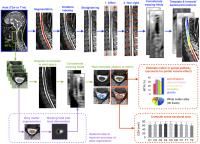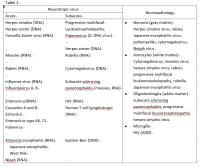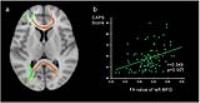ISMRM 24th Annual Meeting & Exhibition • 07-13 May 2016 • Singapore |
|
Weekend Educational Course:
Neuro 2
Skill Level: Intermediate
Organizers: Kelvin Lim,
M.D. & Toshiaki Taoka, M.D., Ph.D.
Sunday 08 May 2016 |
Overview
This course will explore the uses of MRI in the diagnosis and management
of spine and plexus pathologies, pediatric patients, CNS infections and
psychiatric disease.Target Audience
Neuroradiologists, clinical neurospcialists and neuromaging researchers.
Educational Objectives
Upon completion of this course, participants should be able to:
- Increase the ability to
choose and interpret MR protocols and pulse sequences and relate
imaging to pathology in the Spine and Plexus;
- Increase the ability to
choose and interpret MR protocols and pulse sequences and relate
imaging to pediatric pathology;
- Increase the ability to
choose and interpret MR protocols and pulse sequences and relate
imaging to pathology in CNS Infections; and
- Increase the ability to
choose and interpret MR protocols and pulse sequences and relate
imaging to pathology in depression, addictions and PTSD.
|
|
PROGRAM |
| |
|
|
Spine &
Plexus |
|
| |
|
|
Moderator: Alex MacKay |
|
07:30
|
|
Advanced Mutimodal Imaging of the Spine 
Lawrence N. Tanenbaum1
1RadNet Inc
The role of diffusion weighted imaging has expanded
beyond the brain to whole body applications. This
presentation will explore the contribution of DWI in the
routine evaluation of spinal conditions focusing on its
role in the detection, characterization and surveillance
of neoplastic, degenerative and infectious diseases. MR
spectroscopy has the power to delineate the chemical
signature of tissues in health and disease. Research
suggests detection of key MRS biomarkers may have a role
analogous to provocative discography in identification
of the painful disc. This presentation will cover the
key findings in the painful disc and review the research
work done to date.
|
08:00
|
|
Plexopathy 
Cynthia Chin1, Jason Talbott1,
Ethan Neufeld2, Gabriel Runner2,
and Peter Shen2
1UC San Francisco, CA, United States, 2UC
Davis, CA, United States
Review of the anatomy of the brachial plexus and
lumbosacral plexus and the pathologies resulting in
plexopathy and their imaging characteristics.
|
08:30
|
 |
New Imaging Techniques for Spine & Plexus 
Julien Cohen-Adad1,2
1Department of Electrical Engineering, Ecole
Polytechnique de Montreal, Montreal, QC, Canada, 2Functional
Neuroimaging Unit, CRIUGM, University of Montreal,
Montreal, QC, Canada
While multi-parametric MRI (mpMRI, which includes
functional MRI, diffusion tensor imaging, etc.) has
become popular for brain imaging, it is still difficult
to apply these techniques to the spine because of
complex issues related to acquisition and processing of
the data. In this review we will examine several key
aspects of mpMRI in the spine, namely: hardware, pulse
sequences and image processing techniques – discussing
their present status, unresolved issues, and future
directions.
|
09:00
|
|
Discussion |
09:30
|
|
Break & Meet the Teachers |
|
| |
|
|
|
|
| |
|
|
Pediatric |
|
| |
|
|
Moderator: Suchandrima Banerjee |
|
10:00
|
|
Malformations of Cortical Development - Permission Withheld
Robert C McKinstry1
1Mallinckrodt Institute of Radiology,
Washington University, St. Louis, MO, United States
This lecture presents an update on the genetics,
signaling pathways and abnormal microstructure that lead
to malformations of cortical development. The
organization of this talk is one framework for moving
beyond description of the phenotype to a mechanistic
understanding of cortical malformations.
|
10:30
|
|
Pediatric: Tumours 
Toshio Moritani1
1Department of Radiology, University of Iowa
Hospitals & Clinics, Iowa City, IA, United States
Pediatric brain tumors are a leading cause of
cancer-related death in children. In recent years, new
technologies of molecular and genetic analysis of
pediatric brain tumors have provided abundance of
biological information. This has resulted in refining
tumor classification into subgroups with potential
clinical implications and treatment. This lecture
demonstrates imaging findings and pathology of pediatric
brain tumors and associated genetic syndromes, and an
overview of recent developments in molecular biology and
genetics. This knowledge is important for the diagnosis,
management and future treatment of pediatric brain
tumors as well as guiding future research.
|
11:00
|
|
Perinatal Brain Injury &
Mimics 
P. Ellen Grant1
1Boston Children's Hospital
|
11:30
|
|
Discussion |
12:00
|
|
Lunch & Meet the Teachers |
|
| |
|
|
|
|
| |
|
|
CNS Infections |
|
| |
|
|
Moderator: Toshiaki Taoka |
|
13:30
|
|
CNS Infections: Tropical 
CC Tchoyoson Lim1,2
1Neuroradiology, National Neuroscience
Institute, Singapore, Singapore, 2Duke-NUS
School of Medicine, Singapore, Singapore
In today’s highly connected world, radiologists should
be familiar with typical MRI findings of CNS
manifestations of common tropical diseases, as well as
the limitations of neuroimaging in differential
diagnosis. Multi-disciplinary consultations between
radiologists, neurologist, infectious disease
specialists and neurosurgeons are often helpful to
refine the clinical diagnosis and plan a rational
approach to management. Newer techniques, including MR
spectroscopic and perfusion imaging, may also be helpful
for differential diagnosis. This presentation will
focus on differential diagnosis in schistosomiasis and
neurocysticercosis, and outbreaks of Nipah virus, group
B streptococcus agalactiae infection.
|
14:00
|
|
CNS Infections: Bacterial/Fungal 
Seung Hong Choi1
1Radiology, Seoul National University
|
14:30
|
 |
CNS Infections: Viral 
Cheng-Yu Chen
Viruses that tend to affect the central nervous system
are usually neurotropic. The specific diagnosis of viral
encephalitis requires PCR, serum biomarkers, or culture
which are not available at acute setting, while clinical
and laboratory findings are often non-specific. MR
Imaging study is important in confirming the CNS
involvement. Imaging lesion detection can prompt early
antiviral treatment until proven otherwise. Imaging
approaches to viral CNS infection require background
knowledge of the patients, such as ages, host immunity,
clinical presentations, geographic considerations and
endemics. This lecture will review the basic concepts of
MR imaging approaches to common neurotropic viral
encephalitis.
|
15:00
|
|
Discussion |
15:30
|
|
Break & Meet the Teachers |
|
| |
|
|
|
|
| |
|
|
Psychiatric Disease |
|
| |
|
|
Moderator:
Kelvin Lim |
|
16:00
|
|
Biological Origin of Depression: Evidence from Infant Brain
Imaging and Genetics 
Qiu Anqi
|
16:40
|
 |
Psychiatric Disease: Post-Traumatic Stress Disorder 
Qiyong Gong1
1Huaxi MR Research Center (HMRRC), Dept of
Radiology, West China Hospital of Sichuan University,
Chengdu, China, People's Republic of
This lecture will provide a brief review on the
Post-Traumatic Stress Disorder (PTSD) in general,and an
overview of the PTSD related brain abnormalities
discovered with the use of psychiatric MR, with
particular emphasis on the circuitry impairment as
observed from the circuit- and network-based analysis.
Methodological challenges and opportunities will be
discussed, along with the assessment of the clinical
usefulness of the research findings using psychiatric MR
imaging into the objective diagnosis, prognostic
prediction and treatment evaluation of patients with
PTSD.
|
17:20
|
|
Discussion |
18:00
|
|
Adjournment & Meet the
Teachers |
|
| |
|
|
|
|
| |
The International Society for Magnetic Resonance in Medicine is accredited by the Accreditation Council for
Continuing Medical Education to provide continuing medical education for physicians. |



